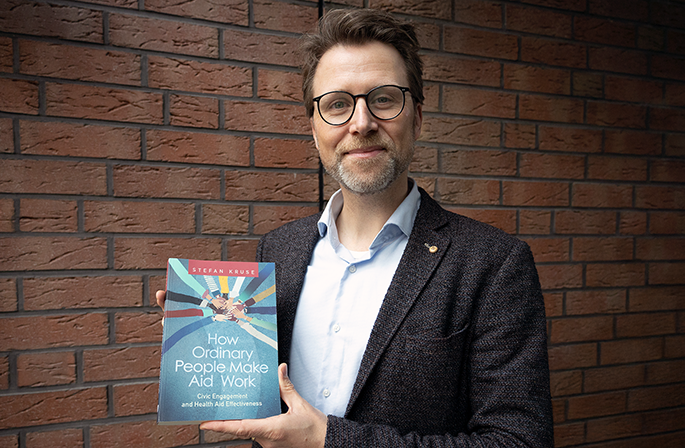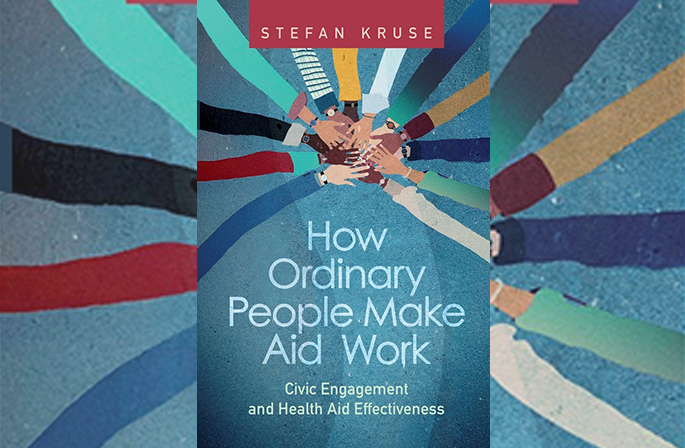THE CULTURAL CONTEXT IS CRUCIAL TO THE SUCCESS OF DEVELOPMENT PROJECTS
Interview
Stefan Kruse is a consultant in the Health Department of GFA Consulting Group – and author of the book ‘How Ordinary People Make Aid Work’, which has just been published by Johns Hopkins University Press. The book is based on several years of research he conducted as a doctoral student and later as a postdoctoral researcher at the Center for the Study of Democracy (ZDEMO) at Leuphana University in Lüneburg/Germany. In this interview, he explores the central theme of his book: how political culture in partner countries influences the effectiveness of international development cooperation in the health sector.
Question: Stefan, the main argument of your book is that the success of development projects depends not primarily on functioning political institutions in partner countries, but above all on a political culture characterised by strong civic engagement. Why do you think this is the case?
Stefan Kruse: Development cooperation has long focused on institutionalized participatory governance – that is, on creating formal spaces for citizen involvement, such as user committees, citizen assemblies or deliberative forums. The expectation was that these instruments would make state actors more responsive and increase accountability and efficiency in service delivery. However, evidence shows that such mechanisms only work when they are embedded in a social structure that can sustain citizen action for accountability. Such a structure is characterized by public interest in community affairs, strong norms of cooperation, participation in elite-challenging activities, and value orientations that emphasize equal opportunity, freedom of choice and citizen voice. These underlying social and cultural factors form the foundation of citizen-led accountability (actions) and are closely tied to communities' levels of social and political engagement. Civic engagement thus shapes ordinary people's willingness and capacity to exercise voice and hold authorities accountable and ultimately functions as a moderating force that enhances the effectiveness of development interventions.
Is that why your book focuses on the importance of social and political engagement?
Yes, exactly. Political engagement refers to participation in parties or trade unions. These forms of organisation are usually inward-looking and oriented towards rent-seeking activities that defend their members’ interests. Within political engagement, I further distinguish between elite-challenging forms – such as participating in demonstrations, signing petitions or joining boycotts – and elite-entrusting forms, such as contacting elected representatives or engaging in professional associations. Social engagement, by contrast, includes participation in leisure, welfare and faith-based associations. Outward-oriented organisations - such as charitable, cultural, recreational, or environmental groups - tend to promote public goods and bridge social divides.
Against this backdrop, the book presents compelling evidence that both social and political engagement significantly enhance the impact of DAH on population and individual health as citizens involved in outward-oriented social networks and those participating in political associations and accountability actions are better positioned and motivated to engage in development projects affecting their communities and to hold authorities to account. Specifically, a panel study shows that both social engagement and political engagement substantially enhance the negative effects of DAH on infant mortality levels. A multilevel study further shows that civic engagement also strengthens the positive impact of DAH on individual well-being. And comparing these effects with formal oversight institutions further reveals that citizen engagement, rather than state capacity or democracy, matters the most.
Does this potential not unfold primarily where stable democratic structures are in place?
On the contrary. Social engagement and elite-entrusting forms of political participation enhance health aid effectiveness regardless of the political context. A vibrant voluntary sector and a politically active citizenry can therefore make development assistance for health (DAH) more effective even in highly centralized, undemocratic, or corrupt recipient countries.
By contrast, elite-challenging forms of political engagement strengthens health aid effectiveness most clearly in bureaucratic, democratic, and decentralized states. In such political contexts, citizen participation in protests, petitions or other elite-challenging activities has the greatest potential to improve health outcomes - where strong administrative capacities, democratic oversight mechanisms, and decentralized decision-making provide an enabling environment for citizen demand to translate into policy change.
In short, elite-entrusting forms of social and political engagement foster the effectiveness of DAH primarily where formal political institutions are weak, whereas elite-challenging participation enhances the impact of DAH on public health mainly where bureaucratic governance, liberal democracy, and decentralization provide an enabling environment under which citizen actions make a positive difference in health aid effectiveness.
How do you define ‘effectiveness’ in development cooperation?
Following the OECD-DAC definition, effectiveness refers to the extent to which development cooperation measures achieve their intended objectives. I refer here to development goals as formulated in the MDGs and the SDGs. In concrete terms, for the health sector this means asking: Do health interventions reduce child and infant mortality in partner countries? To adequately capture such complex causal relationships over time and across different contexts, I combine insights from qualitative case studies with quantitative impact analyses. The central question is always: Under what conditions does health-related development cooperation generate lasting impact?
And what motivated you to focus on the importance of civic engagement in answering this question?
My aim was to close a gap in development research. While political behaviour research has long demonstrated the crucial role of civic engagement for political action and the performance of democracies, the macro-comparative aid effectiveness literature has focused almost exclusively on the role of formal political institutions. What has been missing is a systematic analysis of how political culture, social networks and civil society resources shape the impact of international development cooperation - and how strongly this impact depends on the political context. The book addresses this question in the health sector combining long-term data on global health financing with cross-national survey data on political culture to identify which forms of civic engagement are most effective under different political conditions.
Hasn't the topic of participation in development cooperation already been sufficiently researched?
Research has clearly shown that participation is associated with greater accountability and transparency and – provided it is based on inclusive networks and cooperative norms - fosters both economic and health development. However, comparative development research has largely overlooked these findings, focusing instead almost exclusively on the role of political institutions, such as corruption control. The question of how political culture and political behaviour influence the impact of development cooperation has hardly been investigated systematically to date. This is precisely where my book comes in. Using the health sector as an example, it shows that a culture of civic engagement is vital for the success of development interventions aimed at improving population health.
Your book combines econometric analyses with qualitative case studies. Which specific examples were particularly insightful for you – and what did you learn from them?
One of the most insightful case studies I discuss in the book comes from Guatemala. There, international donors supported volunteering community members - civic activists - in several municipalities to monitor service delivery in local health-care facilities, gather feedback from service users, and engage with authorities at various levels to advocate for improvements. The activists collaborated with traditional authorities and community-based associations, such as agricultural cooperatives and traditional birth-attendant organizations, as a citizen-led initiative.
Together, they documented service delivery problems – such as lack of medicines, poor health infrastructure, cases of abuse and mistreatment - and engaged with public authorities at various levels, demanding improvements. The activists regularly participated in municipal councils, submitted petitions, and engaged with officials at various levels, such as mayors, health district managers, ombudspersons, and national officials.
While the outcomes of the initiatives varied between communities depending on the strength and diversity of relational ties, the study demonstrates that these relational networks were crucial. They enabled communities to mobilize citizen-led accountability action, raise awareness of poor health service provision, and activate vertical accountability mechanisms linking citizens and state institutions.
So, strengthening local actors alone is no guarantee of such positive effects?
Exactly. A second case study from the Democratic Republic of Congo offers a stark contrast. There, too, donors supported civil society initiatives to improve healthcare, particularly in the area of maternal health. But unlike in Guatemala, success was limited. The communities studied lacked trust, social cohesion and cooperative norms. Community organisations acted in isolation, collective action was rare, and in many places political authorities suppressed even moderate demands for accountability.
There were also several structural obstacles: Many actors lacked the knowledge and skills to initiate collective accountability processes, and there were few effective alliances between civil society groups, NGOs and local authorities. Patriarchal values prevented women in particular from actively participating in decision-making processes, while ethnic tensions and a general lack of interest in public health issues further undermined efforts at mobilisation.
What is your conclusion?
Despite similar funding logics, the measures in the second case study were largely ineffective – not because they were poorly designed, but because the cultural, social and political conditions for civil society engagement were missing. Both cases illustrate that (participatory) development cooperation in the health sector does not automatically generate impact. Rather, its effectiveness depends primarily on the cultural context – on trust, shared norms and existing networks. Or, as civil society scholar Michael Edwards aptly puts it with regard to the limits of external support: ‘External support can be useful as the oil that lubricates the engine of associational life, but it can never substitute for the hand that drives the car.’
How does your scientific work specifically feed into your work in GFA's Health Department? Have there been situations where this perspective has helped you in projects?
My research shows that cultural context is crucial to the success of projects. That's why, when acquiring new projects, I look not only at the health situation or indicators of democracy and corruption control, but also at the cultural context: To what extent do citizens extend trust beyond their immediate networks and communities? How much confidence do citizens place in political institutions? How vibrant is civil society? And which prevailing value orientations shape social and political behaviour - individualistic or collectivist values? For instance, in more interdependent contexts, projects often achieve greater success when incentive systems or behavioural change approaches emphasize community and social responsibility rather than focusing solely on individual empowerment.
As a project coordinator in an NCD project in Ukraine, I can see first-hand the central role that civil society networks and grassroots movements play in project implementation – not only in relation to state actors, but also in health campaigns and communication strategies. Their involvement not only increases the reach and impact of our work, but also the legitimacy of our work – and makes it clear that without civic engagement, sustainable change is hardly possible.
> The book ‘How Ordinary People Make Aid Work – Civic Engagement and Health Aid Effectiveness’ is available here.







